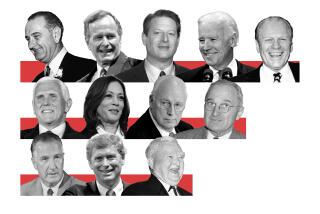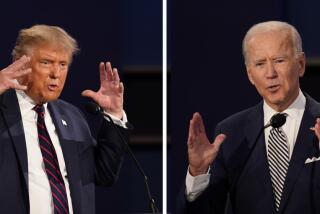A Battle of Loose Cannons : Russia: As in the U.S., the race for the republic’s vice-presidential spot is a lightning rod for controversy.
- Share via
MOSCOW — Some of those running today for vice president of the Russian Republic are the sort who could change the course of history.
Boris Yeltsin, with a touch of genius, made the best choice in Alexander Rutskoi. Rutskoi could get Yeltsin votes he couldn’t even dream of: rank-and-file Communists, military officers, Afghanistan veterans. An air force colonel and a hero of the Afghan War, Rutskoi came into the limelight after a successful hard-line campaign for a seat in the Russian Parliament.
Rutskoi became the darling of orthodox Russian Communists and was elected a member of the Central Committee of the Russian Communist Party. But all hell broke loose when, during the last Congress of Russian People’s Deputies, Rutskoi became the renegade colonel, denouncing the Russian Communist faction for its “non-constructive” position. He formed his own parliamentary group, Communists for Democracy.
Though he’s Yeltsin’s candidate, Rutskoi pays lip service to populist slogans. His main objective, according to the latest interviews, is to form a grotesque system where a free-market economy is united with strong social programs. Lately he is paying more attention to Russian entrepreneurs. “What is socialism? We should work for the good will of the people, not for some ideological nonsense.” It is certainly hard to believe that these words could come from a Russian Communist.
The most controversial choice for vice president was made by Vadim Bakatin, along with Yeltsin one of the three leading presidential hopefuls. Ramazan G. Abdulatipov will become vice president if Bakatin wins. According to some experts, Abdulatipov’s name came up as a tactic to persuade the autonomous regions in Russia to vote for this duo. Abdulatipov, himself not a Russian, chairs the Chamber of Nationalities of the Russian Parliament.
Abdulatipov’s main drawback is that some months ago he signed “the Letter of Six” denouncing Yeltsin, which, according to some reports, was initiated inside the Kremlin. In a republic where the people are highly suspicious of those connected with the central government, this could become a serious stumbling block for Bakatin. Abdulatipov tried to distance himself from the letter, saying in a television interview that after its publication he discussed the contents with Yeltsin. Abdulatipov specifically noted that no political figure should be above criticism.
The last of the big three, Nikolai I. Ryzhkov, decided on Gen. Boris Vsevolodovich Gromov as his candidate. The former commander of Soviet troops in Afghanistan became a national celebrity after a number of publications named him as a possible future Soviet military dictator. Such allegations didn’t stop Mikhail Gorbachev from making him first deputy of the Interior Ministry, in charge of cooling down nationalist violence. The latest use of force in Armenia and Azerbaijan by Interior Ministry forces shows that Gromov’s hard-line approach to solving internal problems hasn’t cooled down.
The fighting general preaches socialist values and law and order. He is highly negative toward the Baltics and has many times stated that Russia should not rely on the West in its economic reforms. The image of a hard-as-stone soldier could help Ryzhkov, who was known as the “weeping premier,” get the votes of the military brass, World War II veterans and even blue-collar workers who are not happy with the latest price hikes but do not want to see such a weak character as Ryzhkov as president.
One of the strangest couples in the race is another general, Albert Mikhailovich Makashov, and his vice-presidential running-mate, Alexei Alexeyevich Sergeyev, a lawyer turned economist. Sergeyev is well-known for trying to turn history back. A self-proclaimed true Russian patriot and Communist, Sergeyev invites comparison with such figures as Leonid I. Brezhnev, Konstantin U. Chernenko and even Josef Stalin. He is staunchly against Western support for perestroika, is trying to lead a crusade against “cosmopolitanism” and thinks that parliaments should be elected not by citizens, but by factories, or “by unions of workers” from factories and other government-owned enterprises.
As he once said in an interview, Sergeyev believes that those who fight against “internationalism”--i.e. against guerrillas and terrorists around the world--are fascists. Among his supporters one can surely count Cuba’s Fidel Castro and Libya’s Moammar Kadafi.
As for myself, I’ll have to reconsider my Russian citizenship if this pair wins.
More to Read
Sign up for Essential California
The most important California stories and recommendations in your inbox every morning.
You may occasionally receive promotional content from the Los Angeles Times.












